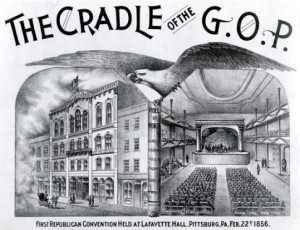Mr. Tim Alberta, a generally commendable fellow whose columns I typically enjoy, has a piece up at National Review today arguing that, if Donald Trump wins both Ohio and Florida tomorrow, it will be “nearly impossible” for his only viable competitor, Sen. Ted Cruz, to deny Mr. Trump the 1,237 delegates Mr. Trump needs to win the nomination.
This is the same conventional wisdom I have railed against time and time and time again in recent weeks, and, normally, I would let this one pass, but Alberta (unlike most pundits panicking about March 15th), has actually done some delegate math, which he lays out in his article. This lends his piece the appearance of mathematical rigor.
However, while Mr. Alberta is to be commended for going through the actual delegate math, as so many other pundits have failed to do, his ultimate conclusions are based on grossly inaccurate assumptions about how Sen. Cruz would perform in head-to-head races against Mr. Trump. These assumptions defy all available polling data, and lead Mr. Alberta to believe that Cruz would lose most contests with Trump in a head-to-head race. Yes, it is obviously true, as Mr. Alberta contends, that, if a candidate loses most of the head-to-head races, he is not going to win a primary season — nor would he deserve to, since that would prove him to be the less popular candidate. But there is no good reason to be so terribly pessimistic about Cruz’s chances in head-to-head races with Trump. On the contrary, Cruz is likely to win most races (and most delegates) once his rivals (Sen. Rubio and Sen. Kasich) have been eliminated from the race.
We can see this from the exit polling data in Michigan and Mississippi, in two ways:
(1) The obvious way: in Michigan, a demographically middling blueish-purple state where Trump won by 12 points (36% – 24%), polling shows that Trump would lose to Cruz in a head-to-head contest by 13 points (54% – 41%). That’s not even close, and shows, in effect, a 25-point swing in Cruz’s favor if Rubio and Kasich drop out of the race. Trump currently leads almost everywhere, but nowhere does he lead by more than 15 points. It would be a Trump-loving state indeed where Cruz would even be capable of losing with that kind of national lead on Trump.
(2) The precise way: FiveThirtyEight combined exit polls from Michigan and Missouri to determine exactly how Rubio and Kasich’s voters would behave if both dropped out, making the primary a head-to-head between Cruz and Trump. They determined that 25% of Rubio’s voters would stay home, 60% would vote for Cruz, and 15% for Trump. 45% of Kasich’s voters would stay home, 37% would vote for Cruz, and 18% for Trump. (You may recognize these numbers from the recent De Civ post, “How Much is Rubio Helping Trump?“.)
We can take these numbers and compute likely results in various states. For example, FiveThirtyEight’s current weighted polling average in Wisconsin (which Mr. Alberta calls “prime terrain” for Trump) shows Mr. Trump with 30% of the vote, Rubio with 20%, Cruz with 19%, and Kasich with 8%. (23% are either undecided or support candidates who have now dropped out.) If Rubio and Kasich then drop out, according to the Michigan exit polls, Trump ends up with 37% of the remaining vote, and Cruz gets 38% — Cruz wins Wisconsin. That’s without counting the undecideds, who typically favor the non-Trump candidate (which is why Trump keeps underperforming his final poll numbers, even in states where he wins). “Prime terrain” for Trump? With respect, Mr. Alberta, the data do not support you.
This is broadly supported at the national level, as well, for those who go in for national polls. The latest NBC/Wall Street Journal poll, which pushed undecideds toward one candidate or another and sampled only likely voters, had Trump at 30%, Cruz at 27%, Rubio at 20%, and Kasich at 22%. Redistribute those votes as above, and Cruz has a 54% – 46% lead over Mr. Trump.
So let’s dispel once and for all with this myth that Trump is a national leader if Rubio and Kasich drop out. On the contrary, Rubio and Kasich dropping out makes Cruz the national leader — and is the only plausible path to making anyone but Trump the national leader. What about Alberta’s claim that the individual states coming up tend to favor Trump?
For the most part, Alberta’s claims here are based simply on wild assumptions. Trump would be “heavily favored” to win in Arizona because “the Republican base is highly animated by immigration and border security.” (The state that keeps re-electing pro-amnesty Sen. John McCain? Seriously?) This defies Cruz’s regional performance in most Western states so far, and ignores the polling data, which shows a close race once Rubio and Kasich are out (though Cruz’s win would still depend on get-out-the-vote efforts and undecideds in the state’s closed primary). New York’s closed primary “could actually help Trump,” even though Trump has consistently and dramatically undershot his final poll numbers in closed primaries so far, because “Democrats in his home state won’t be able to show up and vote against him.” (The white working-class Democrats of upstate New York represent one of Mr. Trump’s strongest potential voter areas, so locking them out could not be better news for Mr. Cruz.)
Nebraska, says Mr. Alberta, “could be a tossup,” for no particular reason, which is pretty shocking given that Cruz has beaten and usually dominated Trump in every nearby state that has voted so far (Minnesota, Iowa, Kansas, Colorado, Texas, Arkansas, Wyoming, and Idaho). In California, “Trump could could be expected to win more than half, and probably closer to two-thirds” of congressional districts, because… actually, Mr. Alberta doesn’t give a reason. Again, though, his conclusion stands in stark defiance of the only available polling data, a January 2016 Field Poll which showed Cruz leading Trump even before Cruz’s polling surge and before the field began to consolidate. The Field Poll is extremely bearish on Trump’s chances in California for a wide variety of reasons, all of them still applicable today.
There are only two areas where I agree with Mr. Alberta’s analysis: Cruz is likely to do relatively poorly in the Northeast, where Trump has done very well so far (which tells you most everything you need to know about why the Republican party in the Northeast has failed), so his projection of “at least 100 delegates” on April 26th seems about right to me. Also, Cruz may split the vote with Trump in the Pacific Northwest, where there is precious little polling data so far and demographics do not clearly favor either candidate (Cruz’s libertarian streak likely favors him there, while his evangelical streak hurts him. Trump is likely the opposite.)
Everywhere else, Mr. Alberta does good delegate math, but based on extremely pessimistic assumptions about Cruz’s performance head-to-head with Trump. This leads him to conclude, in error, that Trump is highly likely to win the race if Trump wins both Ohio and Florida. (Since there is no path plausible to stopping Trump with Kasich and Rubio in the race — at least, none I’m aware of — Mr. Alberta appears to concede the entire nomination to Trump through his aggressive naysaying on Cruz.) His analysis is inaccurate, and should be disregarded in toto.
In reality, there is a good case to be made that the optimal strategy for stopping Trump involves Trump winning both Ohio and Florida, which would force the field to consolidate around Cruz. Nate Silver thinks that’s plausibly the best anti-Trump strategy (a “close call”), and I believe it outright. The much bigger risk is posed by the possibility that Rubio and/or Kasich will cling to their doomed candidacies a second past March 16th, which would give Trump every opportunity to sweep across the remaining backloaded winner-take-all and winner-take-most states to win the nomination. The faster the field consolidates, the clearer the path to stopping Trump.




